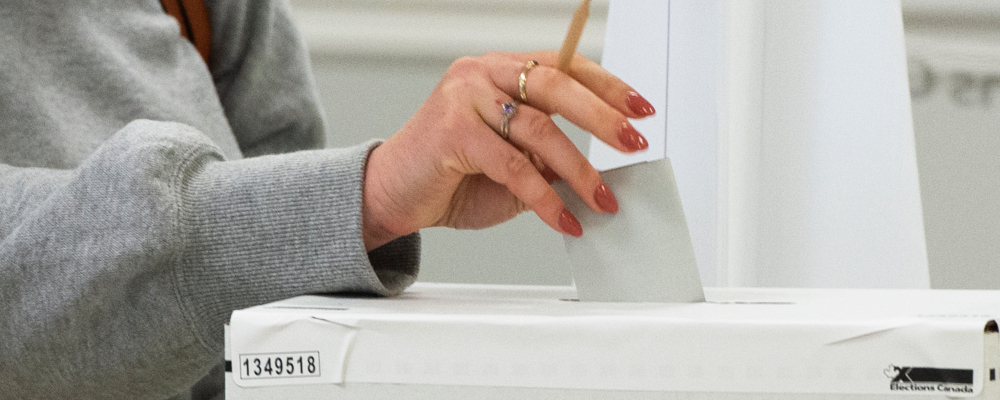Running a marathon is not for the weak. Running for political office is even more grueling.
As someone who has run marathons, I could not imagine becoming a candidate for a political party. It is like doing a full marathon at the pace of a 400-metre dash.
In recent weeks, we’ve seen the old chestnut of party nomination race unfairness take centre stage once again. This time it was National Post columnist turned federal Conservative nominee contender in Aurora—Oak Ridges—Richmond Hill Sabrina Maddeaux, who decried a “corrupted process” and “potential illegal actions taken by another campaign.” She said that the party had not responded to her concerns—though party officials later said what she alleged was not true. Maddeaux opted to pull out of the race as a result.
Becoming a party nominee typically requires a vast network of supporters, dozens of generous donors, and a large group of fully dedicated volunteers that not only are predisposed to your political party of choice, but are prepared to support you personally to become a general election candidate.

Even if a candidate is able to secure this key foundation, he or she still needs to understand how the game is played. Navigating the inner politics of each party is often harder than competing with opponents from other parties—particularly in so-called “safe ridings” where the party nomination race is effectively deciding who will become the riding’s next representative.
As of the September 2021 federal election, there were 338 electoral districts across the country. If reports are correct, with five new districts now created, there will be 343 electoral districts for the 2025 federal election. Accounting for just the three major political parties and assuming there are roughly four candidates per party nomination (though in some cases there can be fewer or more), there are thousands of Canadians who stand for nomination elections each cycle.
The different political parties broadly rely on the same nomination process to select their local candidates. The way it works is that, while the particular rules differ for each party, basically anyone in each riding who is 14 years or older and has permanent residency can become a member of the party for a nominal fee. (It is now free for the Liberal Party of Canada.) The membership is typically closed at some point prior to the nomination vote and only those who are members of good-standing by a certain date can cast their vote for the candidate of their choice.
This incentivizes candidates to both sell memberships at scale and then try to persuade those among the “closed membership” to vote for him or her. Some have argued that there shouldn’t be the option to sell memberships during a nomination race. That is to say, the selection should be limited to pre-existing members. The problem with this thinking is that precludes the kind of energy and growth that’s typically needed to win general elections. This is especially true in opposition-held ridings. Competitive nomination races can inject a lot of the people and resources that can ultimately help the winning candidate flip the riding in the subsequent election.
I have experience with a number of nomination races over the years during my time at the Ontario Progressive Conservative Party’s. There is not a single nomination race that concludes without some conflicts and disagreements. They usually stem from different factors, including claims that the rules established by the political party have preferenced one candidate or another. To be fair to political parties, this is not a system that they invented but is a dupe of how our general election works—with all the issues and shortcomings that come with it.
Over the past few months, we’ve seen some nomination candidates chose to drop out of their respective nomination races claiming foreign interference, suspicious activities by opponents, character assassinations, or unfair access to party memberships. This has started a conversation online about how the political parties should address such allegations and what is the best way to hold nominations. There are even those who have argued that we ought to effectively nationalize political parties by subjecting their processes to Elections Canada’s oversight.
There are two main problems with this. First, although political parties are key institutional parts of our democracy, they’re still ultimately private institutions with their own preferences and values. The Reform Party’s approach to internal democracy was obviously different than the old Progressive Conservative Party. Standardizing political parties under the imposition of a narrow set of common rules would homogenize our politics.
Second, what most people are missing when it comes to issues like this is that candidates face the exact same problems, in a bigger magnitude, during the general election. Forget the rose-coloured concepts like democracy, transparency, and integrity. Elections in Canada are dog fights. And, for good reason. The issues are stake—including fundamental tensions between freedom and equality or liberty and order—ultimately matter.
A particular candidate might be a leader’s favourite or the campaign team’s favourite, just like Rana Sarkar, who was allegedly a close with top advisor Gerald Butts in a 2014 federal Liberal Party nomination at Don Valley North. Yet Geng Tan reportedly brought over a thousand people in buses to vote for him in that nomination race and ultimately won. Leading up to the 2018 election, Ontario PC nomination candidates would at times come and dump thousands of membership forms for a single nomination race, some of which were later reported to be bogus.

That is to say, no one would argue that the party nomination process is perfect. Identity politics and diaspora organizing create other big challenges to nominations as large groups in a community blindly sign up for memberships just because a leader or the head of the household, usually a father or grandfather, tells them to do so. In some ridings, you can have one set of voters show up on nomination day, one that does not necessarily vote in the general election.
The issue with many “star” candidates who come from academia, media or business is that they can be out of touch with the realities of how elections are won in this country. There are exceptions of course. But the notion of the star candidate descending on a riding—particularly one that he or she has little connection to—often fails.
Which brings me to a key point: whatever the flaws of a party nomination race, it’s realistically speaking a good practice for what candidates have to face on election day. Winning a party nomination, in other words, is good battle testing for the general election. Foreign interference and smear campaigns are by no means the sole domain of party nominations, after all.
If you run for nomination for a political party, keep your head down and work hard. Most people in a riding do not really care about your impressive background in law, or journalism, or the corporate world, but they will care if they see you work hard. “Buzz” can only take you so far. Stay away from fancy events and panel talks with audiences that won’t contribute to membership sales or votes. Twitter is not the real world. Focus on tasks that matter: the thankless grunt work done in the political mud.
That involves selling memberships and engaging with communities in your riding. Selling memberships is one of the most difficult things I have ever done in my life. You have to spend a lot of time on it. There is no shame in realizing you can not sell enough memberships and if you think the race is unfair, communicate with the party officials and just work harder.
When you choose to run for a political party, it ostensibly means you have enough faith and understanding of how that party works. If you choose to drop out instead of fighting to the end, and air party dirty laundry publicly, then you are probably not fit to be a candidate anyway. Instead, consider leaving gracefully with your head held high and your dignity intact.
Recommended for You

‘Very odd set of developments’: Why Canada recognizing a Palestinian state rewards Hamas

Howard Anglin: Liberals push for constitutional change, notwithstanding national unity

Tim Sargent: Letter to a minister: Introducing a series of policy agendas for Canada’s federal ministers

The Weekly Wrap: The radical gamble to rewrite Canada’s constitutional order




